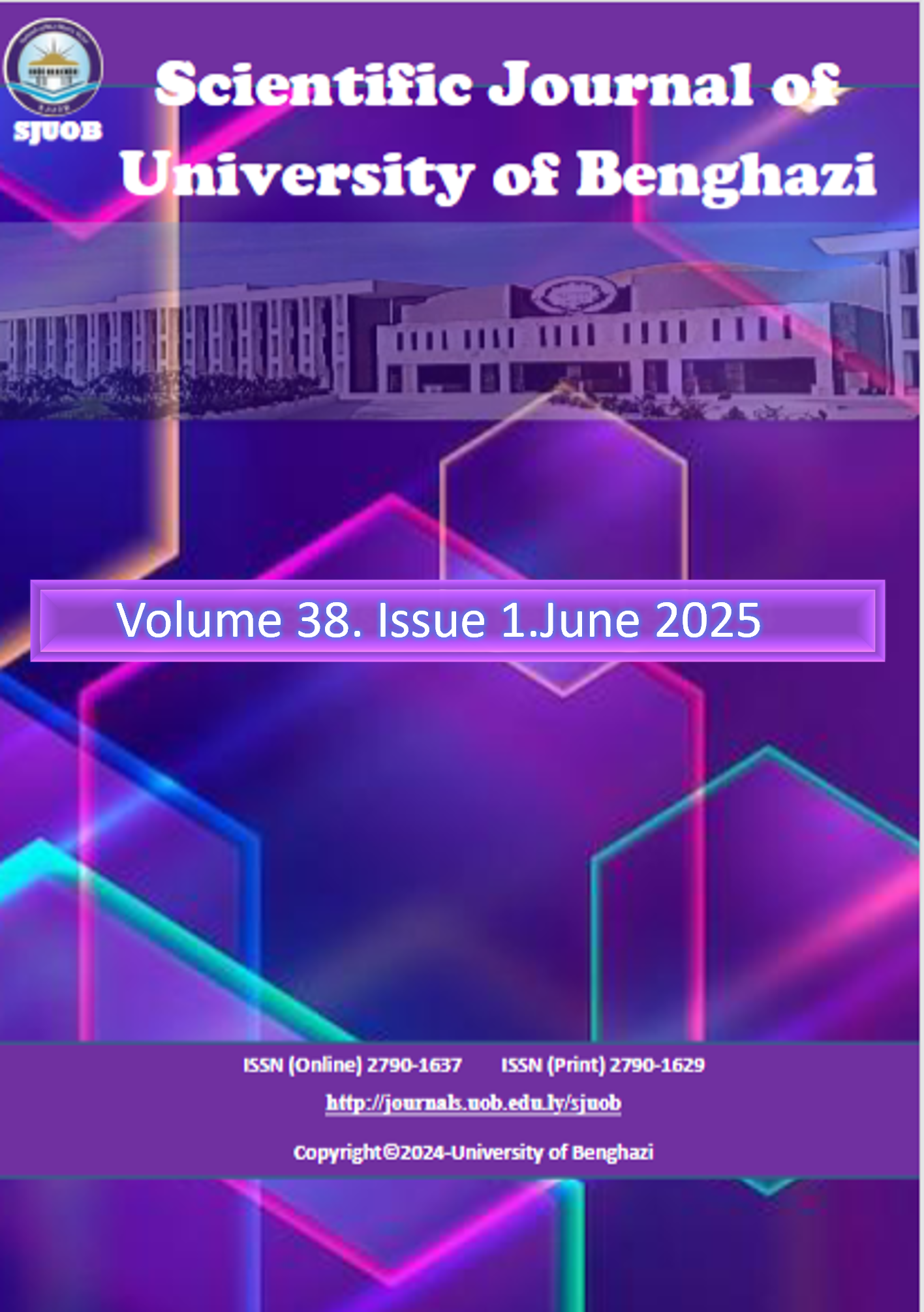Median Versus Paramedian Spinal Anesthesia: PDPH Incidence in Urological Procedures.
DOI:
https://doi.org/10.37376/sjuob.v38i1.7329Keywords:
medial technique, paramedian technique, postdural puncture headache, spinal anaesthesia, urological surgeriesAbstract
Spinal anaesthesia is a popular method for anaesthesia in the lower body, offering advantages over general anaesthesia. The paramedian and median methods are most commonly used. Spinal anaesthesia has many benefits, but postdural puncture headache (PDPH) is the most common risk. This study aimed to find out how often PDPH happens in Libyan patients having spinal anaesthesia for urological surgeries, comparing the median and paramedian methods because there are not many records available. This prospective study occurred at the Specialty Surgical Centre in Benghazi, Libya, from September 18, 2019, to February 18, 2020. Patients undergoing urological surgery under spinal anaesthesia were divided into two groups based on the method used: median (Group M) and paramedian (Group P). Researchers collected age, BMI, and gender data to better understand PDPH prevalence and compare the two companies. All the data were coded and analysed using SPSS 27. The study included 60 patients, including 53 adult males and 7 females, ranging in age from 11 to 70 years, with a median age of 55.5 ± 18.2 years. Normal PDPH prevalence was 8.3%, with 13.3% in Group M and 3.3% in Group P. Statistical analysis showed no significant difference in PDPH prevalence between the two companies (p=0.4). Patients’ age, gender, and BMI did not differ significantly between the two groups, according to logistic regression analysis. While a larger number of patients in the median institution had PDPH, the difference was not statistically significant. These findings support previous research on needle insertion techniques and PDPH, but the authors suggest conducting larger studies with more populations to confirm and improve those findings.
Downloads
References
Capdevila X, Aveline C, Delaunay L, Bouaziz H, Zetlaoui P, Choquet O, et al. Factors determining the choice of spinal versus general anesthesia in patients undergoing ambulatory surgery: results of a multicenter observational study. Advances in Therapy. 2020;37:527-40.https://doi.org/10.1007/s12325-019-01171-6
Fedorov A, Lehto A, Klein J. Inhibition of mitochondrial respiration by general anesthetic drugs. Naunyn-Schmiedeberg’s Archives of Pharmacology. 2023;396(2):375-81.https://doi.org/10.1007/s00210-022-02338-9
Siddiqi A, Mahmoud Y, Secic M, Tozzi JM, Emara A, Piuzzi NS, et al. Mepivacaine versus bupivacaine spinal anesthesia for primary total joint arthroplasty: a systematic review and meta-analysis. The Journal of Arthroplasty. 2022;37(7):1396-404. e5.https://doi.org/10.1016/j.arth.2022.03.031
Leeda M, Stienstra R, Arbous M, Dahan A, Veering BT, Burm A, et al. Lumbar epidural catheter insertion: the midline vs. the paramedian approach. European journal of anaesthesiology. 2005;22(11):839-42.https://doi.org/10.1017/S0265021505001419
Podder S, Kumar N, Yaddanapudi LN, Chari P. Paramedian lumbar epidural catheter insertion with patients in the sitting position is equally successful in the flexed and unflexed spine. Anesthesia & Analgesia. 2004;99(6):1829-32.https://doi.org/10.1213/01.ANE.0000136774.99702.14
Peterson EE, Riley BL, Windsor RB, editors. Pediatric intracranial hypotension and post-dural puncture headache. Seminars in Pediatric Neurology; 2021: Elsevier.
Choi DY, Lee SE, Lee MW, Lee KH, Kang E, Kwon JY, et al. Prediction of the Cervical Epidural Space Depth from the Skin Using Cervical X-Ray, During Cervical Epidural Block with Paramedian Approach. Journal of Pain Research. 2023:2079-90.https://doi.org/10.2147/JPR.S409347
Liu S, Carpenter RL, Neal JM. Epidural anesthesia and analgesia: their role in postoperative outcome. The Journal of the American Society of Anesthesiologists. 1995;82(6):1474-506.
Lambert DH, Hurley RJ, Hertwig L, Datta S. Role of needle gauge and tip configuration in the production of lumbar puncture headache. Regional anesthesia and pain medicine. 1997;22(1):66-72.https://doi.org/10.1016/S1098-7339(06)80058-1
Sharma HM, Khandelwal M, Beniwal S, Gurjar SS, Sharma S. Comparison of sitting versus lateral decubitus position during spinal anaesthesia on the occurrence of post-dural puncture headache in patients undergoing lower segment caesarean section: A randomised controlled trial. Indian Journal of Anaesthesia. 2022;66(10):738-40.https://doi.org/10.4103/ija.ija_725_21
Stanhope E, Foulds L, Sayed G, Goldmann U. Diagnosing causes of headache within the postpartum period. J Obstet Gynaecol. 2018;38(5):728
Kurnutala LN, Kim D, Sayeed H, Sibai N. Persistent spinal headache after removal of intrathecal drug delivery system: a case report and review of literature. Anesthesiology and pain medicine. 2015;5(5).https://doi.org/10.5812/aapm.29786
Befikadu A, Timerga S, Mihretu F, Siyoum F, Agmuas A. Prevention and Management of Post-Dural Puncture Headache (PDPH). International Journal of Anesthetics and Anesthesiology. 2022;9(2):143-4.https://doi.org/10.23937/2377-4630/1410143
Apfel C, Saxena A, Cakmakkaya O, Gaiser R, George E, Radke O. Prevention of postdural puncture headache after accidental dural puncture: a quantitative systematic review. British journal of anaesthesia. 2010;105(3):255-63.https://doi.org/10.1093/bja/aeq191
Weji BG, Obsa MS, Melese KG, Azeze GA. Incidence and risk factors of postdural puncture headache: prospective cohort study design. Perioperative Medicine. 2020;9:1-6.https://doi.org/10.1186/s13741-020-00164-2
Karami T, Karami N, Rastgo H. Comparison of the effect of paramedian and median methods on postdural puncture headache among candidates for elective ce-sarean sections undergoing spinal anesthesia. A double blind. Pediatr Anesth Crit Care J. 2021;9:116-22.https://doi.org/10.14587/paccj.2021.19a
Oumer KE, Aychew H, Daniel T, Mekete G, Belete KG, Negash TT. Incidence and associated factors of post-dural puncture headache among orthopaedic patients after spinal anesthesia: a prospective cohort study. Annals of Medicine and Surgery. 2023;85(10):4703-8.https://doi.org/10.1097/ms9.0000000000001167
Mosaffa F, Karimi K, Madadi F, Khoshnevis SH, Besheli LD, Eajazi A. Post-dural puncture headache: a comparison between median and paramedian approaches in orthopedic patients. Anesthesiology and Pain Medicine. 2011;1(2):66-9.https://doi.org/10.5812/kowsar.22287523.2159
DelPizzo K, Luu T, Fields KG, Sideris A, Dong N, Edmonds C, et al. Risk of postdural puncture headache in adolescents and adults. Anesthesia & Analgesia. 2020;131(1):273-9.https://doi.org/10.1213/ANE.0000000000004691
Harrison D, Langham B. Spinal anaesthesia for urological surgery: a survey of failure rate, postdural puncture headache and patient satisfaction. Anaesthesia. 1992;47(10):902-3
Jahromi MSS, Zabetian H, Kalani N, Khosravani F, Yousefi A. Comparing the Incidence of Postdural Puncture Headache (PDPH) between Median and Paramedian Approaches in Nephrolithotripsy under Spinal Anesthesia. International Journal of Medical Investigation. 2023;12(1):83-91
Mohamed R, Amin M, Omar H. Computed tomography-guided celiac plexus neurolysis for intractable pain of unresectable pancreatic cancer. Egyptian Journal of Radiology and Nuclear Medicine. 2017;48:627-37.10.1016/j.ejrnm.2017.03.027.
Tafesse D, Melkamayew A. Magnitude of postdural puncture headache and associated factors in obstetric mothers undergone spinal anesthesia for caesarean section. J of Anes & Cri Open Access. 2019;11(2):46-50
Gisore E, Mung’ayi V, Sharif T. Incidence of post-dural puncture headache following caesarean section under spinal anaesthesia at the Aga Khan University Hospital, Nairobi. East African medical journal. 2010;87(6):227-30.https://doi.org/10.4314/eamj.v87i6.63078
Ali HM, Mohamed MY, Ahmed YM. Postdural puncture headache after spinal anesthesia in cesarean section: Experience in six months in 2736 patients in Kasr El aini teaching hospital–Cairo University. Egyptian Journal of Anaesthesia. 2014;30(4):383-6.https://doi.org/10.1016/j.egja.2014.06.001
Weinrich J, von Heymann C, Henkelmann A, Balzer F, Obbarius A, Ritschl P, et al. Postdural puncture headache after neuraxial anesthesia: incidence and risk factors. Der Anaesthesist. 2020;69:878-85.https://doi.org/10.1007/s00101-020-00846-y
DelPizzo K, Cheng J, Dong N, Edmonds CR, Kahn RL, Fields KG, et al. Post-dural puncture headache is uncommon in young ambulatory surgery patients. HSS Journal®. 2017;13(2):146-51
Khraise WN, Allouh MZ, El-Radaideh KM, Said RS, Al-Rusan AM. Assessment of risk factors for postdural puncture headache in women undergoing cesarean delivery in Jordan: a retrospective analytical study. Local and Regional Anesthesia. 2017:9-13.https://doi.org/10.2147/LRA.S129811
Mohammed A, Ayyuba R, Salisu I, Nagoma A, Owolabi L, Ibrahim A. An analysis of postdural puncture headache in obstetric patients: A study from Kano, Nigeria. Tropical Journal of Obstetrics and Gynaecology. 2017;34(1):16-20
Singh J, Ranjit S, Shrestha S, Limbu T, Marahatta SB. Post dural puncture headache. Journal of Institute of Medicine Nepal. 2011;32(2):30-2.https://doi.org/10.59779/jiomnepal.501
Dittmann M, Schaefer HG, Renkl F, Greve I. Spinal anaesthesia with 29 gauge Quincke point needles and post dural puncture headache in 2,378 patients. Acta anaesthesiologica scandinavica. 1994;38(7):691-3.https://doi.org/10.1111/j.1399-6576.1994.tb03978.x
Lybecker H, Møller JT, May O, Nielsen HK. Incidence and prediction of postdural puncture headache A prospective study of 1021 spinal anesthesias. Anesthesia & Analgesia. 1990;70(4):389-94
Tarkkila PJ, Heine H, Tervo R-R. Comparison of Sprotte and Quincke needles with respect to post dural puncture headache and backache. Regional Anesthesia and Pain Medicine. 1992;17(5):283-7
Wu CL, Rowlingson AJ, Cohen SR, Michaels RK, Courpas GE, Joe EM, et al. Gender and post–dural puncture headache. The Journal of the American Society of Anesthesiologists. 2006;105(3):613-8
Haider S, Butt KJ, Aziz M, Qasim M. Post dural puncture headache-a comparison of midline and paramedian approaches. Biomedica. 2005;21(July-December):90-2
Nisar A, Saleem J, Hussain S, Bashir K. Comparison of postdural puncture headache in median and paramedian approach under spinal anesthesia in cesarean section. Pak J Med Health Sci. 2016;10(1):298-301.
Downloads
Published
How to Cite
License
Copyright (c) 2025 Scientific Journal of University of Benghazi

This work is licensed under a Creative Commons Attribution-NonCommercial-NoDerivatives 4.0 International License.



















